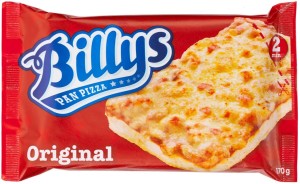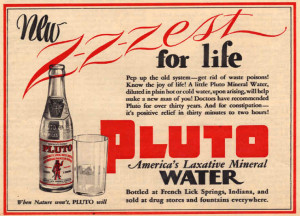by Michelle Gagnon
So I stumbled across an interesting piece in the LA Times the other day about an editor-turned-agent-turned-entrepeneur who has hooked up with the site “OpenSky” to help authors market more than just books to their audience. She listed one intriguing example: fellow crime fiction writer Michael Koryta has a book set in an old hotel in Central Indiana known for its “Pluto Water,” which apparently has health benefits. If Koryta hooked up with Open Sky, the novel could be tied to both the promotion of the hotel and of the water (OpenSky would find a supplier to bottle and ship it).
Another example: A cookbook author not only sells books through OpenSky, but also hawks a favorite barbecue sauce and grill. The author pockets 50% of the profit, with the rest going to OpenSky and others involved in the transaction.
It’s an interesting model. While the author of the piece jokes about whether or not Steig Larsson would have considered peddling the coffee his protagonist drinks, one of the things that struck me while reading THE GIRL WITH THE DRAGON TATTOO was the name dropping. Salander never had a mere generic pizza, she always ate “Billys Pan Pizza” (and lots of them). Likewise, the computer she used (a Mac), the cigarettes everyone smoked (Lucky Strikes), the cell phones they placed calls from (Sony-Ericssons)…all were named repeatedly, to the point where I wondered if Larsson had been secretly hoping for product placement tie-in deals.
Television has already started experimenting with this possibility. Some of the next generation cable boxes will enable consumers to click on the screen if they like, say, the dress that a character is wearing, which will immediately place an order to their account. And voila, a few days later they’re sporting Eva Longoria’s maxi dress.
So should authors consider going to same route?
There are certainly arguments against it (as I read the article, I could almost feel the collective shudder of horr or emanating from traditional publishing houses). Books are seen by many as more than a mere commodity. A friend of mine compared it to offering happy meal trinkets when buying an oil painting. But in this age of dwindling marketing budgets, can books afford not to think outside the box? Film and television studios have both incorporated significant product placement in their offerings to offset revenue reductions. And with more books being consumed electronically, does it make sense to integrate links for people who develop a hankering for “Billys Pan Pizza” while reading the novel? Wouldn’t a cross-marketing campaign like the one pitched for Koryta’s book benefit everyone involved?
or emanating from traditional publishing houses). Books are seen by many as more than a mere commodity. A friend of mine compared it to offering happy meal trinkets when buying an oil painting. But in this age of dwindling marketing budgets, can books afford not to think outside the box? Film and television studios have both incorporated significant product placement in their offerings to offset revenue reductions. And with more books being consumed electronically, does it make sense to integrate links for people who develop a hankering for “Billys Pan Pizza” while reading the novel? Wouldn’t a cross-marketing campaign like the one pitched for Koryta’s book benefit everyone involved?
As I read it, I tried to think about what OpenSky would be willing to sell from my books. I suspect that night vision goggles and Glocks wouldn’t be their first choice, although both figure prominently in my last book (and in retrospect, I probably should have incorporated more specific brand names). But it is set in Mexico City- a link to a tourist agency, perhaps? Or an airline? Better yet, the best security company to call should you get kidnapped?
Is OpenSky offering just another opportunity to sell out, or could it provide a much needed boost to authors struggling to market and make money off their work?
